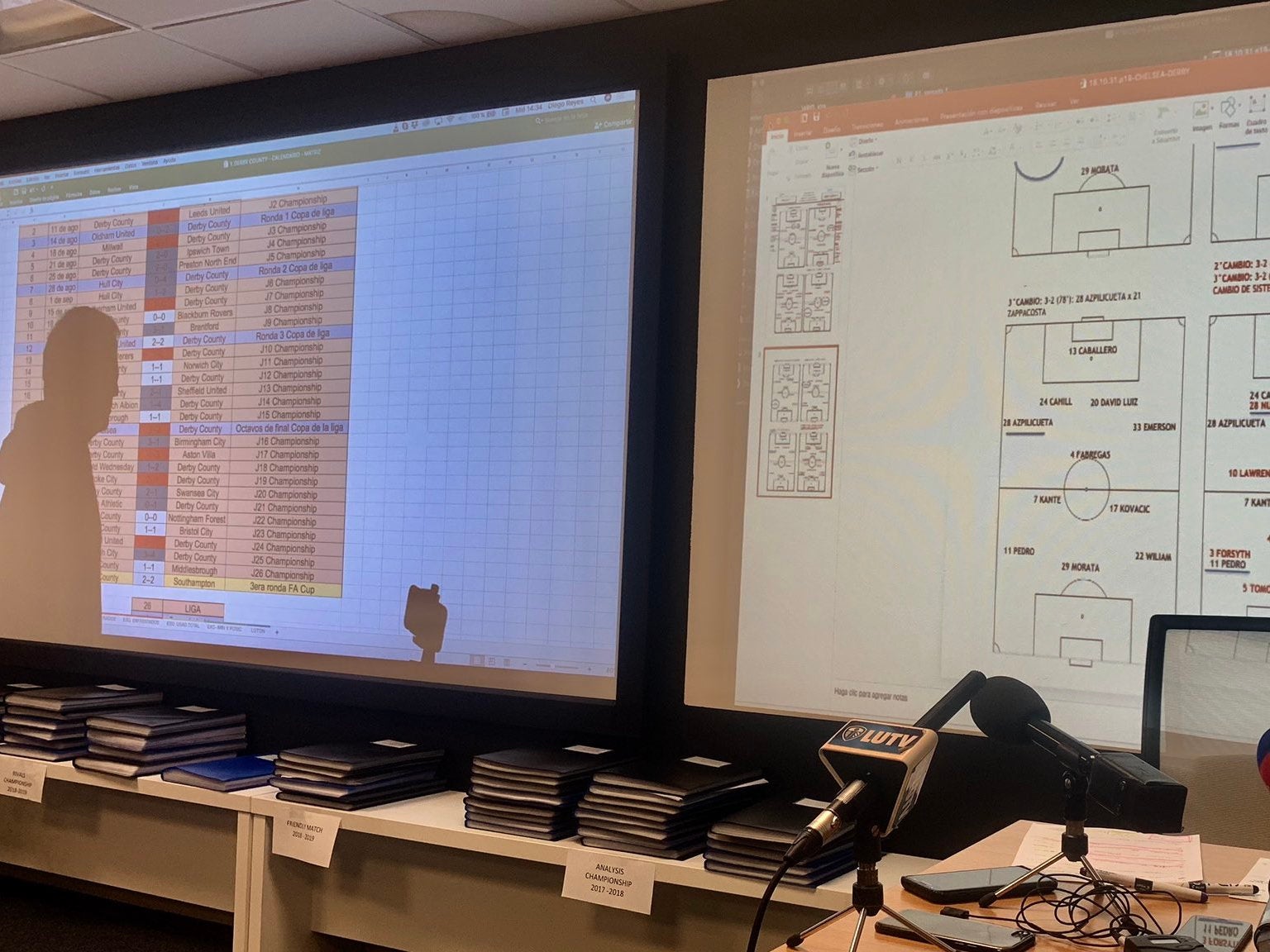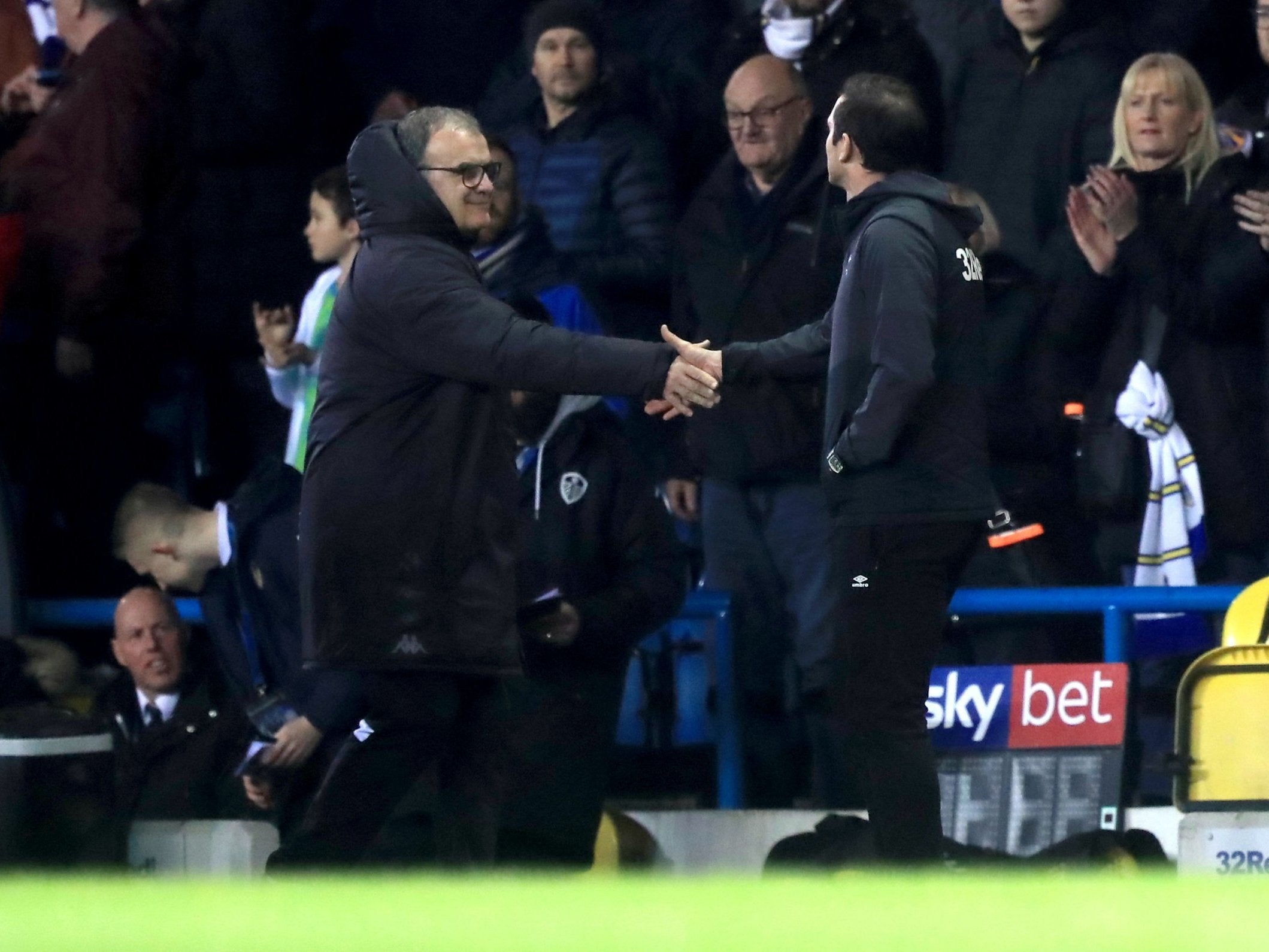The Marcelo Bielsa 'spygate' row is another tiresome chapter in football's culture war - and there was no winner
There are two sides to every story - but what if both are wrong?

Your support helps us to tell the story
From reproductive rights to climate change to Big Tech, The Independent is on the ground when the story is developing. Whether it's investigating the financials of Elon Musk's pro-Trump PAC or producing our latest documentary, 'The A Word', which shines a light on the American women fighting for reproductive rights, we know how important it is to parse out the facts from the messaging.
At such a critical moment in US history, we need reporters on the ground. Your donation allows us to keep sending journalists to speak to both sides of the story.
The Independent is trusted by Americans across the entire political spectrum. And unlike many other quality news outlets, we choose not to lock Americans out of our reporting and analysis with paywalls. We believe quality journalism should be available to everyone, paid for by those who can afford it.
Your support makes all the difference.On Wednesday night’s episode of The Debate on Sky Sports, Tim Sherwood was invited to discuss the Marcelo Bielsa spying story at Leeds United. Clearly, this had all the makings of one of the television events of the week: the sort of encounter that would encapsulate the low-flying culture war currently engulfing English football. Tactics Tim taking on Tactics Marcelo. Fingers on keyboards, everybody. This was going to be good.
“The audacity to come out and do this,” Sherwood said, the bile rising in him, the red-white-and-blue veins popping out of his temples, “is top-drawer.”
Oh.
“Everyone is capable of doing it to one another, and they should be allowed to do it, in Bielsa's eyes,” Sherwood continued, his bloodshot eyes narrowing with pure reactionary rage. “It's a minor advantage and a minute detail.”
Hang on a sec.
“He will feel there's no stone unturned in his preparation,” Sherwood concluded, the patriotic pride swelling in him as he prepared to swat this poncey foreigner all the way back where he came from. “And at the moment, you have to say he's doing a great job.”
But there was a problem. Sherwood wasn’t officially allowed to hold this opinion. It didn’t readily fit into the paradigm of what we’ve decided a man like Sherwood should think about a man like Bielsa. And so it got largely ignored in favour of more reliable naysayers like Martin Keown , whose years in the media have allowed him to perfect a slightly better quality of ban-this-filth outrage.
Within the game, meanwhile, the prevailing reaction to Bielsa’s decision to spy on opposition teams by sending a club employee to watch their training sessions largely aligned with Sherwood’s: on a fraying spectrum somewhere between sympathy and indifference. “Far too much has been made of it,” said Sheffield United’s Chris Wilder. “I think Leeds United have been very, very clever. I've got to say that it's been going on for 30, 40, 50 years in different scenarios, and I think it's been blown up a little bit too much, really.”
And in a way, this was a broad reflection of the almost uniformly positive reaction Bielsa has received among his fellow coaches since assuming the Leeds position last summer. “He is a top, top manager,” enthused Middlesbrough’s Tony Pulis. “He’s very experienced, he knows what the game is all about.” “His name doesn’t make him a great manager - his team does,” said Rotherham’s Paul Warne after a 2-0 defeat at Elland Road in August. “The most important thing is that he has a way of working and it’s given the whole club a shake-up,” former Leeds boss Paul Heckingbottom said earlier in the season. “The club needed that.”

So where, then, has the outrage come from? Largely, it’s been imagined and invented. Both by the pundit class, the vast and diseased corpus of professional opinion-formers whose livelihood depends on finding something about which to be outraged every week for money, and by the mind-dustbin of social media, the vast and diseased corpus of amateur opinion-formers whose self-worth depends on finding someone outraged to laugh at every week for likes. For both, the issue of Bielsa’s spying, and even Bielsa himself, has been simply a handy canvas upon which to enact a theatrical masked joust only tangentially connected with reality.
The point is that football is an obsessive game, populated by obsessives. In the same way that even the most inept Premier League referee knows the rules of the game far better than Tony off Twitter, even the most reactionary of coaching dinosaurs will possess a far superior theoretical understanding of the game to even the most dedicated amateur enthusiast. Even the much-ridiculed Frank Lampard, naturally hurt at his Derby team being on the receiving end of Bielsa’s antics, admitted to being a fan of Bielsa’s and having one of his books in his front room.
This point is so obvious it should barely require stating, but Marcelo Bielsa has far, far more in common with someone like Tim Sherwood than he does with some tactics blogger from East Sussex. As much as we like to divide and distinguish them, the guild of football management is really a sort of fraternity, a shared vocation in which the only one who can truly understand the obsession is the fellow obsessive.

The only thing remarkable about Bielsa’s 70-minute Powerpoint presentation at Thorp Arch on Wednesday wasn’t any of its content, but the fact that Bielsa had chosen to make it public. The research itself - both in its volume and level of detail - would have been fairly familiar to any coach working at a reasonable level. None of which seemed to stymie the predictable consensus on social media that Bielsa had totally stuck it to the gammons , absolutely triggered the proper football men, showed two fingers to Tommy Robinson, fnaw fnaw, please click on this Patreon link to buy my self-published book, etc.
If there ever was a culture war within English football, it’s largely been won and lost now. Everybody presses. Everybody uses data. Everybody prepares opposition dossiers in granular, exhaustive detail. Everybody thinks Bielsa is a great manager who has done a terrific job at Leeds. It’s only at the margins, in the crud-encrusted forums of public debate, that the war is still being fought: a form of identity politics that thrives on amplifying division in the service of egotistical subtext.
So: the argument that Bielsa did nothing wrong has become a fancy way of saying “I am clever and cultured, and grasp football in ways you don’t.” Equally: the argument that Bielsa crossed the line and disrespected the game has become a surrogate for “I am moral and patriotic in tune with football’s traditions, and grasp football in ways you don’t.”
It’s at tiresome times like this that I like to remember the words of that unlikeliest of footballing philosophers: Jadon Sancho. The Borussia Dortmund and England forward is, mercifully, yet to be canvassed for his views on Spygate. But the young often have a unique, uncynical knack for cutting through the white noise of football in a way many of us don’t, and earlier this season he was asked in an interview about how he had coped with what must have been the seismic culture shock of swapping the blood-and-fire world of English football for the refined footballing laboratory of the Bundesliga. Sancho simply replied, in his characteristic laconic style: “It’s all football, isn’t it?”
Join our commenting forum
Join thought-provoking conversations, follow other Independent readers and see their replies
Comments